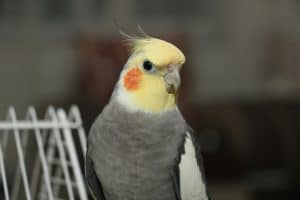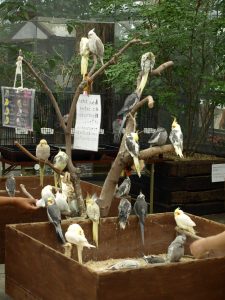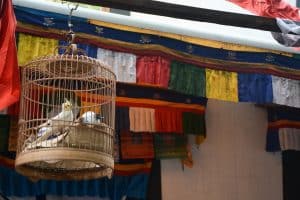Are you thinking about adding a feathered friend to your family? If so, the first question to address is, “Where do you get your cockatiel?” Cockatiels, admired for their endearing personalities and remarkable mimicry skills, make wonderful companions. It’s essential to select a source that prioritizes their health and socialization.
From breeders to rescue centers and pet stores, each option offers unique advantages and potential drawbacks. Understanding what to look for and what to avoid in your search for the perfect cockatiel is crucial. By making an informed choice, you’ll ensure a healthy start for your new pet and support ethical practices in breeding and rescue.
Understanding Cockatiels

When considering introducing a cockatiel to your home, it’s critical to understand not only where to acquire one but also the bird’s natural behaviors and needs. This knowledge ensures you select a healthy bird from a responsible source and supports their wellbeing in your care.
Origins and Natural Habitat
Cockatiels originate from the semi-arid regions of Australia, thriving mainly in the Australian Outback. These birds are accustomed to a harsh environment, which has shaped their ability to adapt to various conditions. Typically, they reside in bushlands and wetlands, where they can find ample food and water despite the arid conditions.
Understanding their natural habitat can help you replicate aspects of it in captivity to maintain their health and happiness. This background explains why they need an environment that can offer plenty of space and stimulation in your home.
Temperament and Characteristics
Cockatiels are known for their affable and sociable nature, making them excellent pets, especially if they are hand-raised or hand-fed from a young age. They possess a charming demeanor characterized by whistling and mimicking sounds, which they use to communicate or when seeking attention. Female cockatiels, in general, are quieter and less vocal than their male counterparts but can be equally engaging.
Despite their sociable nature, each cockatiel has a distinct personality; some may require a few weeks to adjust to new surroundings or new pets. They’re generally tame, but like other pets, they need time to grow accustomed to their owners and any other birds or animals in the house. Awareness of these specific traits is crucial when you bring a new cockatiel into your family, ensuring a smooth transition for the bird and a fulfilling companionship for you.
- COCKATIEL FOOD: Large variety of seeds, grains and vegetables in every bowl to provide the balanced variety of nutrients that cockatiels need with great taste theyll love.
- ADVANCED NUTRITION: Contains vitamins, minerals and Omega-3 fatty acids to support healthy skin and shiny feathers.
- IMPORTANT VARIETY: Unique mix of millet, oat groats, safflower seeds, sunflower seeds, cracked corn, peanuts and more creates an irresistible blend to replicate diets found in a natural habitat and encourage foraging behaviors.
- DAILY DIET: Feed cockatiels 2 to 4 tablespoons daily per bird.
- WILD HARVEST BRAND: Offers a full assortment of nutritional and interactive engagement products.
Caring for Cockatiels
Proper care for cockatiels encompasses a balanced approach to diet, attention to common health concerns, and the creation of a supportive environment. Each aspect contributes significantly to their quality of life and longevity.
Diet and Nutrition
A well-rounded cockatiel’s diet is crucial for maintaining your cockatiel’s health. The primary component of their diet should be a high-quality pellet mix, which provides a balanced intake of nutrients. Fresh fruits and vegetables, like apples, carrots, and dark leafy greens, should also be included daily to supplement their meals.
Offer these fresh food in small, manageable pieces to ensure easy consumption and minimal waste. Additionally, clean water needs to be available at all times, replenished daily to aid in digestion and overall health. An occasional treat, like a small piece of cooked egg or a special seed mix, can be offered weekly but should not comprise the bulk of their diet.
Common Health Concerns
Cockatiels, while generally robust, are prone to certain health issues that you need to monitor for. Respiratory problems can be common, often exacerbated by dusty environments or exposure to aerosol sprays. Regularly check for signs of distress, such as labored breathing or tail bobbing. Another frequent health issue is night frights, where a cockatiel might thrash in its cage, potentially injuring itself.
Keeping a night light on and ensuring their cage is in a quiet, secure area can help mitigate these incidents. Always consult with an avian veterinarian if you notice any signs of illness, as early detection is key to effective treatment.
Creating a Suitable Environment
The environment you create for your cockatiel significantly influences their happiness and health. A spacious cage, ideally located away from direct sunlight and draughts, provides a safe haven. Ensure the cage is equipped with various perches of different thicknesses to promote foot health, and ample toys to stimulate their intellect and prevent boredom.
Cleaning the cage weekly with a clean spray bottle, and changing water and food dishes daily, are imperative to prevent the growth of bacteria and maintain good health. The area around the cage should be free of fumes and not overly busy to reduce stress for your cockatiel.
Choosing the Right Cockatiel

Choosing the right cockatiel entails careful consideration of their source as well as their health and personality traits. Your choice impacts your new pet’s adjustment to their new home and their overall well-being.
Assessing Breeders and Rescues
When considering where to get your cockatiel, you have options between breeders and rescues. Reliable breeders provide healthy birds often raised in engaging, hygienic environments. Inquire about their breeding practices and whether they provide a health guarantee. Good signs include transparency about their breeding methods and open communication about the bird’s health history.
Rescues might offer birds that need new homes, often providing you with a chance to adopt a cockatiel that might not have the perfect start in life. Assess the rescue’s reputation and the condition of their facilities. Rescues should execute thorough health checks and behavior assessments before making birds available for adoption. This not only ensures the bird’s health but also aids in matching you with a cockatiel suited to your lifestyle.
Important Considerations When Choosing
Selecting a cockatiel involves careful evaluation of several factors to ensure compatibility with your lifestyle and ability to provide care. First, examine the bird’s health; clear eyes, clean feathers, and active engagement are positive signs. Discuss with the seller or rescue about any past health issues and ensure the bird has been tested for common diseases.
Age and temperament also play crucial roles. Young birds might be easier to tame and train, but older birds can also make excellent companions with the right patient handling. Additionally, consider the bird’s previous socialization experiences, as this influences their behavior and comfort with other pets or humans.
Finally, the setup of the cockatiel’s cage is crucial. It should be spacious with various perches, toys, and food and water dishes to stimulate their physical and mental health. Position the cage in a safe, well-lit area away from direct sunlight and drafts to provide a comfortable habitat for your new pet.
Exploring Pet Stores for Cockatiels

When considering where to get a cockatiel, pet stores can be a viable option. Many pet stores offer a variety of pet birds, including cockatiels. However, it’s important to carefully evaluate the conditions in which these birds are kept. Reputable pet stores should maintain high standards of hygiene and provide ample space and enrichment for their birds.
Advantages of Pet Stores:
- Immediate Availability: Pet stores often have young birds ready for adoption, which can be ideal if you’re looking to bring a new feathered friend home quickly.
- Variety: You might find a range of social birds, giving you a chance to observe different personalities and select one that best matches your preferences.
Things to Consider:
- Health and Socialization: Ensure the store provides clear information about the bird’s health and socialization. The staff should be knowledgeable about the bird’s needs and be able to answer your questions regarding their care.
- Bird’s Perch and Environment: Check that the birds have clean and appropriately sized perches in their enclosures. Proper perches are essential for their foot health and overall comfort.
Things to Consider:
- Health and Socialization: Ensure the store provides clear information about the bird’s health and socialization. The staff should be knowledgeable about the bird’s needs and be able to answer your questions regarding their care.
- Bird’s Perch and Environment: Check that the birds have clean and appropriately sized perches in their enclosures. Proper perches are essential for their foot health and overall comfort.
Social Birds and Their Adaptation
Cockatiels are known for being social birds, making them excellent companions. Their friendly nature means they generally enjoy interaction with humans and other pets. However, proper socialization from a young age is crucial for developing a well-adjusted bird.
Key Points for Social Birds:
- Early Socialization: Young birds that have been hand-raised and well-socialized from an early age are usually more adaptable to new environments and interactions.
- Ongoing Interaction: Regular interaction and enrichment are essential to maintain their social behavior. Providing toys, perches, and daily interaction helps keep them engaged and happy.
Choosing the Right Pet Store
If you’re leaning towards a pet store, make sure to choose one that prioritizes the well-being of their animals. Look for stores that:
- Provide Health Guarantees: Ensure they offer a health guarantee and have a transparent history of their birds’ health.
- Maintain Clean Environments: The cages and perches should be clean, and the store should have a good reputation for animal care.
Wrapping Up: Where Do you Get Your Cockatiel?
Choosing where to get your cockatiel is a crucial decision that will impact both your life and the life of your new feathered friend. By now you’re equipped with the knowledge of what to look for in a healthy bird and the best practices for selecting a reputable source whether it’s a breeder or a rescue. Remember that the right choice ensures a happier healthier bird and a more rewarding experience for you as a pet owner. Take your time evaluate your options and prepare to welcome a delightful new member to your family.
Other suggested articles:





I was reading through some of your posts on this
internet site and I think this internet site is
very informative! Keep on putting up.Blog monetyze